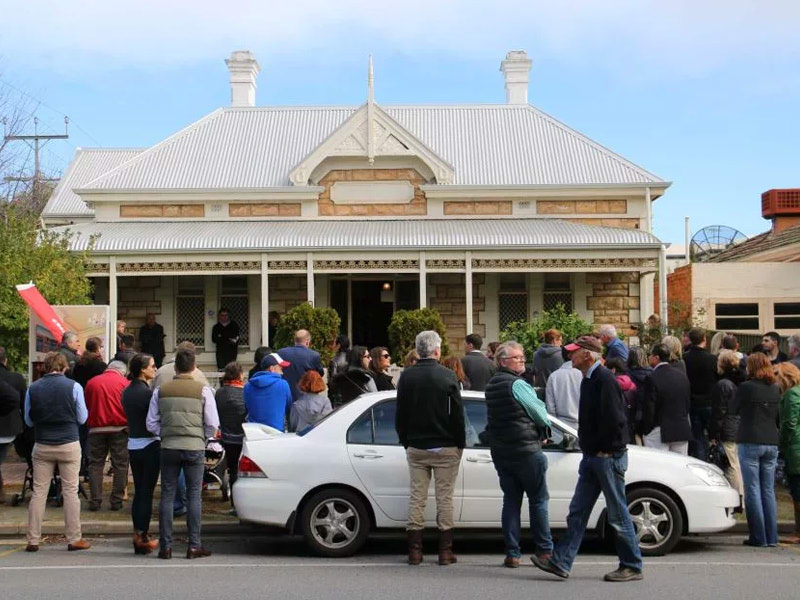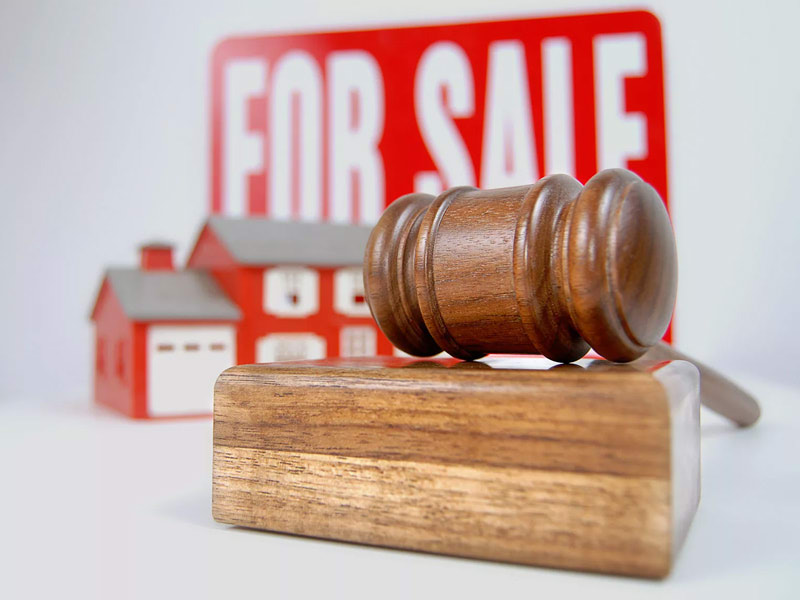An auction is a process where a property is sold to the highest bidder. The bidding usually starts with the property seller, who sets a reserve price that must be reached or exceeded for the auction to result in a sale. The property can’t be sold if no bids are at or above the specified reserve price. The auction will continue unless submissions reach the reserve price during the auction.
Also, this selling system has some nuances, which we will discuss in more detail below, as we get deeper into how to buy the house from the auction.
Auctions are usually conducted by licensed real estate agents and are advertised in local newspapers and online platforms. Auctions are a more favorable option for real estate agents because they accelerate the process for them to get commissions for selling your property.
The seller’s benefit from the auction is obvious — they can sell the property at the highest possible offer. But there are nuances. For example, payment for the auction organization falls on the seller, who may spend money on the auction but fail to hit the reserve price. Also, the auction contract is non-negotiable, and it’s a deal that needs to go fast. Therefore, it automatically turns away some buyers who aren’t ready to rush.
Sounds tricky, right? So, what’s the best way to approach an auction from a buyer’s point of view?
What Are the Risks of Buying Property at Auction in Brisbane?
Let’s say you won an auction in Brisbane. Do you have enough money to pay a transfer duty? Do you know the tax difference between the first and subsequent purchase of property in Brisbane? Such questions are what the typical auction articles define as “unforeseen financial risks.” There is no way to describe all financial risks in this article since there are too many of them and we will go too far from the main topic, but it makes sense to read about transferring property in Brisbane to understand what you will expect to spend after winning the auction.

Buying by auction implies working with a contract without conditions. So don’t bid unless there is no risk you can’t afford the property. Also, you should be prepared for paying a 10% deposit immediately after you are successful at the auction.
The second significant risk is that you won’t get your money back if you notice any problems in the property too late after winning the auction. At the same time, you may not have enough time to thoroughly inspect the house’s condition to ascertain everything is in the best state.
For example, before the auction, you may inspect the area around the house, and everything seems okay. But, after buying the home, it turns out that the fence enters the neighbor’s territory, and you need to demolish this fence.
Another example: In some cases, potential buyers will take the time to make their pest inspections since it’s better to spend an extra $500 on a check than to trust a vendor who is focused on making a quick property sale. But if you find out about the auction too late, you may not have time to make such a check.
When Should You Engage a Conveyancing solicitor When Buying a House at Auction?
The conveyancing solicitor acts as your insurance against making mistakes.
The specifics of an auction are set such that if you win an auction, you must sign the contract. You don’t get a cooling-off period nor are you allowed to turn back.

The contract and the quality of the house are at the buyer’s risk once you become the successful bidder at the auction. That is why, usually, clients turn to conveyancing solicitors before the auction. At this stage, a conveyancing solicitor can help you understand if everything is okay with the contract and the house before you proceed to buy in an auction.
Fortunately, GM Law, after almost thirty years in the Brisbane property market, has grown accustomed to looking a little closer and is willing to discuss different options. Either way, you can call on 1300 185 636, tell us your specific situation and see if we can help make your settlement more secure.
Our flexibility is based on a clear understanding that under specific scenarios, the auction rules QLD may change such that you may need a conveyancer.
What Exactly Can the Conveyancing solicitor Help You with Before the Auction?

There is a general list of recommendations that should be checked before going to an auction:
- Check the contract
- Add special conditions depending on your personal circumstances
- Conduct searches to ensure the property is free from adverse issues.
There are conveyancing lawyers who can help resolve all of these issues when buying an auction house in QLD. It doesn’t mean that you don’t have to personally inspect the swimming pool in the house that you want to buy. It means that, from the point of view of the law, you will get precisely what you expected.
And there is one more thing that makes sense to do before the auction — a pre-auction offer.
Is It Worth Making a Pre-auction Offer?

The organization of an auction can reach many thousands of dollars. So, a few weeks or a few days before the auction, you can offer the seller a pre-auction offer that allows both of you to avoid the fuss.
To make a good offer before the auction, you need to check the sales history, check the contract, and analyze the market, among other requirements. You can do all this on your own or use a buyer’s agent and a conveyancer. If you have tried doing everything yourself but are currently looking for professional help and don’t know who to turn to, then it makes sense to have an overview of how everything works.
Typically, buyer’s agents work together with conveyancing solicitors. First, the buyer’s agent helps the client find the best property and recommends a trusted conveyancing solicitor who will help make all legal considerations.
How Does a Reserve Price Work at Auction?
The reserve price is the minimum selling price that the seller of the property in the auction will accept. The seller sets their desired reserve price in writing with their agent before the auction. A seller is not required by the law to set the reserve price, but most of them opt to have one.
The auctioneer can inform you if the seller has put a reserve price on the property. But, the auctioneer shouldn’t disclose the exact reserve price to you. It is illegal for a property seller or their agents to give you any price guide in a QLD auction, as they don’t know how high the bidding might go.
Once the bidding reaches the reserve price or no reserve price is set, the property is said to be ‘on the market.’
On the other hand, if the highest bid presented in an auction doesn’t meet the set reserve price, it is said to be ‘passed in at auction‘. When this happens, the highest bidder has the first right to buy the property at the seller’s reserve price once it is disclosed. The seller doesn’t have to announce whether the property is on the market, but they can do so if they wish. If they choose to announce, it must be true.

Also, it is essential to note that dummy bids are against auction rules QLD. Sellers use them to increase the bidding during an auction, where a person who isn’t a serious buyer makes a bid. If noted during auctions in Queensland or anywhere else in Australia, they should be reported as they tend to inflate the price of the auctioned property.
Once a property is on the market, the auction must lead to a sale. The winning bidder must purchase the auctioned property, and the seller has to sell it.
After the auction, you can negotiate an agreeable price with the seller if the property doesn’t reach the reserve price. If these negotiations result in a sale within two days of the auction, you will not get a cooling-off period.
If you reach an agreement later than two days after the official auction, you are granted access to a cooling-off period. It would therefore help to be careful as you may waive off your cooling-off period if you are unsuccessful at buying a house at auction QLD but end up signing a sale contract.
Do you need a conveyancer in this case? The cooling-off period involves changes to the contract, so yes, this is the point at which a convening lawyer can help you get better terms.


